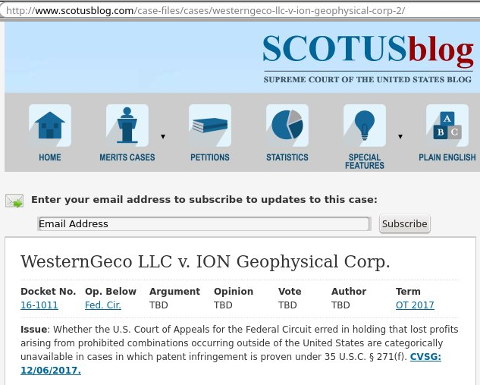

THE patent microcosm has begun speaking more and more about WesternGeco v ION Geophysical -- a case which we've mentioned several times so far this week, usually in the context of Alice being safe from challenge [1, 2].
"It has absolutely no impact on patent scope."To avoid misunderstandings, let is be stressed that the decision -- whichever way it may go -- won't have any profound effect on anything we cover. It's barely of any relevance to us. An article from Prof. Kumar (last revised days ago) is titled "Patent Damages Without Borders" [via] and the abstract is a concise summary of the case: "The presumption against extraterritoriality is a deceptively straightforward principle: that U.S. law applies only inside the United States. But there is confusion regarding whether the presumption applies when a court calculates patent damages. In WesternGeco L.L.C. v. Ion Geophysical Corp., the Federal Circuit held that patent holders who show infringement under €§ 271(f) of the Patent Act cannot recover foreign lost profits. The court maintained that allowing recovery of such damages would result in the Patent Act applying extraterritorially, which cannot be done without Congress’s clear intent. This interpretation severely limits the ability of district courts to make patent infringement victims whole. This Article maintains that the Federal Circuit’s reliance on the presumption is misplaced. The presumption was established to prevent U.S. law from applying to extraterritorial conduct; it was not intended to cover situations where foreign harm flows directly from an act of domestic patent infringement. The presumption has been rebutted under the Supreme Court’s two-step extraterritoriality test. By creating this bright-line rule, the Federal Circuit has unduly restricted the ability of patent holders to recover damages, including in cases where there is no other applicable law. This Article proposes that the Federal Circuit adopt a flexible test that balances prescriptive comity concerns with the United State’s interest in making victims of domestic patent infringement whole."
One can be sure that IAM will already spin that with sensationalist headlines and tweets (saying that the "the US patent system is recovering some of its bite"). From their article:
What gives all this an added angle is that Trump’s comments followed the Supreme Court’s decision to grant cert in WesternGeco LLC v ION Geophysical Corp, a case focused on whether a patent owner, having been successful in an infringement assertion, can recover lost profits that it would have earned outside of the US if the infringement had not occurred. Should the petitioner WesternGeco, which owns the original patents in suit related to conducting marine seismic surveys, be successful then patent owners could see big jumps in the amount of damages they can recoup. The case, which the US Justice Department urged the court to take, is not specifically focused on China, but taken with the trade investigation represents another way in which US authorities maybe about to get much tougher on the infringement of US IP overseas.
Last Friday, the Supreme Court granted certiorari in WesternGeco v. ION Geophysical. Essentially, the case asks whether, when components for a patented process or machine are manufactured in the U.S. and combined or used abroad, the profits lost due to the foreign activities can be considered lost profits and awarded as damages under U.S. patent law.